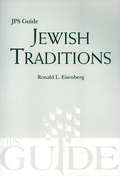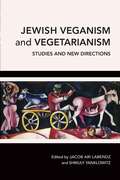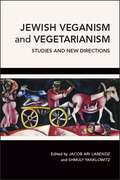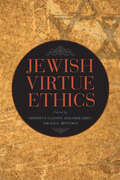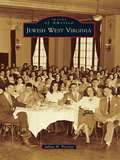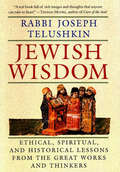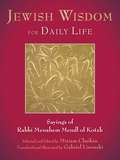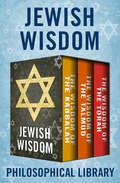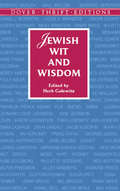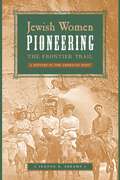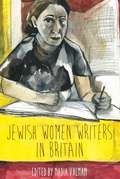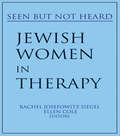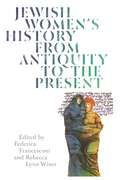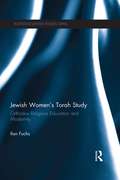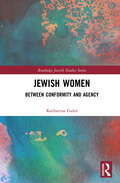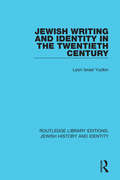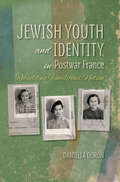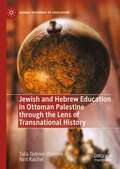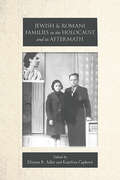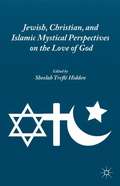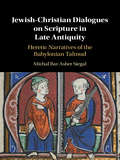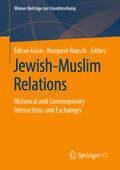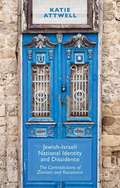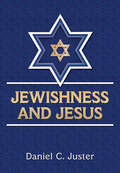- Table View
- List View
Jewish Traditions: JPS Guide (A JPS Guide)
by Dr. Ronald L. EisenbergThanks to these generous donors for making the publication of this book possible: Miles z&”l and Chris Lerman; David Lerman and Shelley WallockThe bestselling guide to understanding Jewish traditions, now in paperbackThis is a comprehensive and authoritative resource with ready answers to questions about almost all aspects of Jewish life and practice: life-cycle events, holidays, ritual and prayer, Jewish traditions and customs, and more. Ronald Eisenberg has distilled an immense amount of material from classic and contemporary sources into a single volume, which provides thousands of insights into the origins, history, and current interpretations of a wealth of Jewish traditions and customs.Divided into four sections—Synagogue and Prayers, Sabbaths and Festivals, Life-Cycle Events, and Miscellaneous (a large section that includes such diverse topics as Jewish literature, food, and plants and animals)—this is an encyclopedic reference for anyone who wants easily accessible, accurate information about all things Jewish. Eisenberg writes for a wide, diversified audience, and is respectful of the range of practices and beliefs within today's American Jewish community—from Orthodox to liberal.
Jewish Veganism and Vegetarianism
by Jacob Ari Labendz Shmuly YanklowitzA multidisciplinary approach to the study of veganism, vegetarianism, and meat avoidance among Jews, both historical and contemporary. <p><p> In recent decades, as more Jews have adopted plant-based lifestyles, Jewish vegan and vegetarian movements have become increasingly prominent. This book explores the intellectual, religious, and historical roots of veganism and vegetarianism among Jews and presents compelling new directions in Jewish thought, ethics, and foodways. The contributors, including scholars, rabbis, and activists, explore how Judaism has inspired Jews to eschew animal products and how such choices, even when not directly inspired by Judaism, have enriched and helped define Jewishness. Individually, and as a collection, the chapters in this book provide an opportunity to meditate on what may make veganism and vegetarianism particularly Jewish, as well as the potential distinctiveness of Jewish veganism and vegetarianism. The authors also examine the connections between Jewish veganism and vegetarianism and other movements, while calling attention to divisions among Jewish vegans and vegetarians, to the specific challenges of fusing Jewishness and a plant-based lifestyle, and to the resistance Jewish vegans and vegetarians can face from parts of the Jewish community. The book’s various perspectives represent the cultural, theological, and ideological diversity among Jews invested in such conversations and introduce prominent debates within their movements.
Jewish Veganism and Vegetarianism: Studies and New Directions
by Jacob Ari Labendz; Shmuly YanklowitzIn recent decades, as more Jews have adopted plant-based lifestyles, Jewish vegan and vegetarian movements have become increasingly prominent. This book explores the intellectual, religious, and historical roots of veganism and vegetarianism among Jews and presents compelling new directions in Jewish thought, ethics, and foodways. The contributors, including scholars, rabbis, and activists, explore how Judaism has inspired Jews to eschew animal products and how such choices, even when not directly inspired by Judaism, have enriched and helped define Jewishness. Individually, and as a collection, the chapters in this book provide an opportunity to meditate on what may make veganism and vegetarianism particularly Jewish, as well as the potential distinctiveness of Jewish veganism and vegetarianism. The authors also examine the connections between Jewish veganism and vegetarianism and other movements, while calling attention to divisions among Jewish vegans and vegetarians, to the specific challenges of fusing Jewishness and a plant-based lifestyle, and to the resistance Jewish vegans and vegetarians can face from parts of the Jewish community. The book's various perspectives represent the cultural, theological, and ideological diversity among Jews invested in such conversations and introduce prominent debates within their movements.
Jewish Virtue Ethics (SUNY series in Contemporary Jewish Thought)
by Geoffrey D. Claussen; Alexander Green; Alan L. MittlemanWhat is good character? What are the traits of a good person? How should virtues be cultivated? How should vices be avoided? The history of Jewish literature is filled with reflection on questions of character and virtue such as these, reflecting a wide range of contexts and influences. Beginning with the Bible and culminating with twenty-first-century feminism and environmentalism, Jewish Virtue Ethics explores thirty-five influential Jewish approaches to character and virtue.Virtue ethics has been a burgeoning field of moral inquiry among academic philosophers in the postwar period. Although Jewish ethics has also flourished as an academic (and practical) field, attention to the role of virtue in Jewish thought has been underdeveloped. This volume seeks to illuminate its centrality not only for readers primarily interested in Jewish ethics but also for readers who take other approaches to virtue ethics, including within the Western virtue ethics tradition. The original essays written for this volume provide valuable sources for philosophical reflection.
Jewish War under Trajan and Hadrian
by William HorburyTwo major Jewish risings against Rome took place in the years following the destruction of Jerusalem - the first during Trajan's Parthian war, and the second, led by Bar Kokhba, under Hadrian's principate. The impact of these risings not only on Judaea, but also on Cyrene, Egypt, Cyprus and Mesopotamia, is shown by accounts in both ancient Jewish and non-Jewish literature. More recently discovered sources include letters and documents from fighters and refugees, and inscriptions attesting war and restoration. Historical evaluation has veered between regret for a pointless bloodbath and admiration for sustained resistance. William Horbury offers a new history of these risings, presenting a fresh review of sources and interpretations. He explores the period of Jewish war under Trajan and Hadrian not just as the end of an era, but also as a time of continuity in Jewish life and development in Jewish and Christian origins.
Jewish West Virginia (Images of America)
by Julian H. PreislerWest Virginia has a unique history of Jewish settlement dating back to 1849 when the first Jewish organization in the state, a Jewish burial society, was established by a small group of German Jewish immigrants in the city of Wheeling. From modest beginnings, Jews settled in towns and cities and established businesses and communal organizations. Since that time, the Jews of the Mountain State have been an integral part of the state's economic, cultural, and political life. Though always relatively small in size, West Virginia's Jewish population has been a strong advocate for the state and gained prominence in many areas. Readers will recognize images of well-known institutions such as Shoney's, Cohen's, Frankenberger's, Embee's, and others that bring back fond memories. Despite declines in Jewish population numbers, today's Jewish community remains active and involved in the life of the state.
Jewish Wisdom
by Joseph TelushkinWhen, if ever, should lying be permitted? If you've damaged a person's reputation unfairly, can the damage be undone?Is a person who sells weapons responsible for how those weapons are used?if the fetus is not a life, what is it? How, as an adult, can one carry out the command to honor one's parents when they make unreasonable demands?What are the nine biblical challenges a good person must meet?What do the great Jewish writings of the last 3,500 years tell us about these and all other vital questions about our lives? Rabbi Joseph Telushkin has devoted his life to the search for answers within the teachings of Judaism. In Jewish Wisdom, Rabbi Telushkin, the author of the highly acclaimed Jewish Literacy, weaves together a tapestry of stories from the Bible and Talmud, and the insights of Jewish commentators and writers from Maimonides, Rashi, and Hillel to Einstein, Isaac Bashevis Singer, and Elie Wiesel. A richer source of crucial life lessons would be hard to imagine.Accompanying this extraordinary compilation is Teluslikins compelling commentary, which reveals how these texts continue to instruct and challenge Jewsand all people concerned with leading ethical livestoday As he discusses these texts, Rabbi Telushkin addresses issues of fundamental interest to modern readers: how to live with honesty and integrity in an often dishonest world; how to care for the sick and dying; how to teach children to respect both themselves and others, how to understand and confront such great tragedies as antisemitism. and the Holocaust; what God wants from humankind. Within Jewish Wisdom's ninety chapters the reader will find extended sections illuminating Jewish perspectives on sex, romance, and marriage, what kind of belief in God a Jew can have after the Holocaust, how to use language ethically, the conflicting views of the Bible and Talmud on the death penalty, and much, much more.Jewish Wisdom adds a new dimension to the many widely read contemporary books that retell the stones and reveal the essence of classic religious and secular literature. Possibly the most far-ranging volume of stories and quotations from Jewish texts, Jewish Wisdom will itself become a classic, a book that not only has the capacity to transform how you view the world, but one that well might change how you choose to live your life.
Jewish Wisdom for Daily Life: Sayings of Rabbi Menahem Mendl of Kotzk
by Miriam Chaikin Gabriel LisowskiRabbi Menahem Mendl was a Hassidic master renowned for his wisdom throughout Europe. The spiritual leader of the Jews in a small stetl called Kotzk in a corner of Poland, he was nevertheless so famous that he was he was referred to far and wide as the Kotzker. His wise sayings--about human nature, how to live, and the world of the spirit--were repeated and passed around, and, though he kept no records, they have been savored and preserved through the years. This beautifully produced collection gathers more than 130 of his sayings and joins them with elegant cut-paper illustrations by the rabbi's great-great-great-grandson, the illustrator Gabriel Lisowki, who has also provided an introduction about his ancestor.Jewish Wisdom for Daily Life is a treasure for spiritual seekers or anyone who enjoys life's lessons distilled into trenchant and memorable aphoristic gems. Here are a few:Everyone has something to teach, even a thief. If he fails he tries again. If he finds nothing of value, he takes what he finds.There is nothing more whole than a broken heart.Angels are God's favorite creatures. It's easy to see why. They are not jealous and they like to sing.Whoever believes in miracles is an imbecile. Whoever does not is an atheist.
Jewish Wisdom: The Wisdom of the Kabbalah, The Wisdom of the Talmud, and The Wisdom of the Torah (Wisdom)
by Philosophical LibraryFrom the sacred texts of Judaism: ancient and lyrical reflections on the meaning of life, faith, and humanity.The Wisdom of the Kabbalah: Handed down in the oral tradition for thousands of years and transcribed in fourteenth-century Spain, the Kabbalah is the classical expression of Jewish mysticism. This collection draws from the main work of Kabbalah—Sepher ha-Zohar, or The Book of Splendor. The Wisdom of the Talmud: Developed in the Jewish academies of Palestine and Babylonia, the Talmud is the rabbinical commentary on the Torah. From man&’s purpose and miracles, to marriage and wellness, to consciousness and community, the Talmud considers the practice of faith on a daily basis through a changing world. This approachable guide explores how interpretation of the Torah has informed Jewish life for thousands of years. The Wisdom of the Torah: In Hebrew, the word Torah means instruction, and for thousands of years, the Torah has provided instruction in Judaism, Christianity, and Islam. The inspirational selections in this collection include some of its most powerful and poetic passages, such as &“The Poems of King David,&” &“The Parables of King Solomon,&” and &“The Love Songs of King Solomon.&”
Jewish Wit and Wisdom (Dover Thrift Editions: Speeches/Quotations)
by Herb Galewitz"It's no disgrace to be poor," observed Sholom Aleichem, "but it's no great honor, either." "Happiness is having a large, loving, caring, close-knit family in another city," remarked George Burns, while Marc Chagall noted that "Art is the unceasing effort to compete with the beauty of flowers and never succeeding." These and many more classic examples of Jewish wit and wisdom — sometimes hilarious, frequently profound, almost always incisive — enliven the pages of this entertaining and practical little volume.Some 500 aphorisms include observations and remarks from statesmen, writers, artist, philosophers, jurists, musicians, and celebrities — from the prophets of the Old Testament, the Talmud, and Maimonides to Joey Adams, Barbra Streisand, and Woody Allen. Here also are memorable quotes from Louis Brandeis, Martin Buber, Fanny Brice, Heinrich Heine, Sam Goldwyn, Golda Meir, Karl Marx, Groucho Marx, Herman Mankiewicz, Albert Einstein, and many others.Arranged alphabetically by author, these thought-provoking pronouncements will not only serve as a handy resource for speech writers and public speakers but will also amuse and inspire all readers.
Jewish Women Pioneering the Frontier Trail: A History in the American West
by Jeanne E. AbramsThe image of the West looms large in the American imagination. Yet the history of American Jewry and particularly of American Jewish women—has been heavily weighted toward the East. Jewish Women Pioneering the Frontier Trail rectifies this omission as the first full book to trace the history and contributions of Jewish women in the American West.In many ways, the Jewish experience in the West was distinct. Given the still-forming social landscape, beginning with the 1848 Gold Rush, Jews were able to integrate more fully into local communities than they had in the East. Jewish women in the West took advantage of the unsettled nature of the region to “open new doors” for themselves in the public sphere in ways often not yet possible elsewhere in the country. Women were crucial to the survival of early communities, and made distinct contributions not only in shaping Jewish communal life but outside the Jewish community as well. Western Jewish women's level of involvement at the vanguard of social welfare and progressive reform, commerce, politics, and higher education and the professions is striking given their relatively small numbers.This engaging work—full of stories from the memoirs and records of Jewish pioneer women—illuminates the pivotal role these women played in settling America's Western frontier.
Jewish Women Writers in Britain
by Nadia ValmanAgainst a background of enormous cultural change during the nineteenth and twentieth centuries, writing by British Jewish women grappled with shifting meanings of Jewish identity, the pressure of social norms, and questions of assimilation. Until recently, however, the distinctive experiences and perspectives of Jewish women have been absent from accounts of both British Jewish literature and women's writing in Britain. Drawing on new research in Jewish studies, postcolonial criticism, trauma theory and cultural geography, contributors in Jewish Women Writers in Britain examine the ways that these women writers interpreted the experience of living between worlds and imaginatively transformed it for a wide general readership. Editor Nadia Valman brings together contributors to consider writers whose Jewish identity was central to their practice as well as those whose relationship to their Jewish heritage was oblique, complicated, or mobile and figured in their work in varied and often unexpected ways. The chapters cover a range of genres including didactic fiction, devotional writing, modernist poetry, autobiographical fiction, the postmodern novel, memoir, and public poetry. Among the writers discussed are Grace Aguilar, Celia and Marion Moss, Katie Magnus, Lily Montagu, Amy Levy, Nina Salaman, Mina Loy, Betty Miller, Eva Figes, Ruth Fainlight, Elaine Feinstein, Anita Brookner, Julia Pascal, Diane Samuels, Jenny Diski, Linda Grant, and Sue Hubbard. Expanding the concerns of Jewish literature beyond existing male-centered narratives of the heroic conflict between family expectations and personal aspirations, women writers also produced fiction and poetry exploring the female body, maternity, sexual politics, and the transmission of memory. While some sought to appropriate traditional Jewish literary forms, others used formal and stylistic experimentation to challenge a religious establishment and social conventions that constrained women's public freedoms. The extraordinary range of responses to Jewish culture and history in the work of these writers will appeal to literary scholars and readers interested in Jewish women's history.
Jewish Women in Therapy: Seen But Not Heard
by Ellen Cole Rachel J SiegelHere is the first volume ever to focus on the issues of Jewish women in the context of counseling and psychotherapy. Through poignant reflection and observation, the authors convey the richness and variety of Jewish women’s experiences and the Jewishness and femaleness of the concerns, issues, values, and attitudes that Jewish women--both clients and therapists--bring into the therapy room.Jewish Women in Therapy is a landmark book in many ways. It calls attention to the historical and political realities of the Jewish heritage and acknowledges the oppression of both Jews and women that therapists have typically ignored. And although Jewish women have participated in the therapeutic process, as clients, scholars, and therapists, seldom have they chosen to write about it.Never before have the writings of so many distinguished leaders in the field, including Melanie Kaye/Kantrowitz, Evelyn Torton Beck, and Susannah Heschel, been compiled. They examine the damaging stereotypes of Jewish women--the Jewish American Princess and the Jewish Mother--that flourish today. Chapters also address the conflicts that many women feel about being Jewish and being female, celebrate the contributions of Jewish women to feminism and to therapy, examine the deliberate omission of women from the political process and the religious ritual, and convey the complexities of the oppression that are still blatantly directed at both Jews and females.
Jewish Women's History from Antiquity to the Present
by Debra Kaplan Elisheva Carlebach Nadia Valman Judith R. Baskin Dianne Ashton Moshe Rosman Marla Brettschneider Dina Danon Rebecca Lynn Winer Natalia Aleksiun Rachel Adelman Benjamin M. Baader Joseph and Esther Foster Professor in Judaic Studies Sylvia Barack Fishman Book Review Editor Federica Francesconi ChaeRan Freeze Tal Ilan Book Review Editor Melissa R Klapper Sharon Koren Frances Malino Renee Levine Melammed Lilach Rosenberg-FriedmanJewish Women’s History from Antiquity to the Present is broad in geographical scope exploring Jewish women’s lives in what is now Eastern and Western Europe, Britain, Israel, Turkey, North Africa, and North America. Editors Federica Francesconi and Rebecca Lynn Winer focus the volume on reconstructing the experiences of ordinary women and situating those of the extraordinary and famous within the gender systems of their times and places. The twenty-one contributors analyze the history of Jewish women in the light of gender as religious, cultural, and social construct. They apply new methodologies in approaching rabbinic sources, prescriptive literature, and musar (ethics), interrogating them about female roles in the biblical and rabbinic imaginations, and in relation to women’s restrictions and quotidian actions on the ground. They explore Jewish’s women experiences of persecution, displacement, immigration, integration, and social mobility from the medieval age through the nineteenth century. And for the modern era, this volume assesses women’s spiritual developments; how they experienced changes in religious and political societies, both Jewish and non-Jewish; the history of women in the Holocaust, their struggle through persecution and deportation; women’s everyday concerns, Jewish lesbian activism, and the spiritual sphere in the contemporary era. Contributors reinterpret rabbinical responsa through new lenses and study a plethora of unpublished and previously unknown archival sources, such as community ordinances and court records, alongside autobiographies, letters, poetry, narrative prose, devotional objects, the built environment, illuminated manuscripts, and early printed books. This publication is significant within the field of Jewish studies and beyond; the essays include comparative material and have the potential to reach scholarly audiences in many related fields but are also written to be accessible to all, with the introductions in every chapter aimed at orienting the enthusiast from outside academia to each time and place.
Jewish Women's Torah Study: Orthodox Religious Education and Modernity (Routledge Jewish Studies Series)
by Ilan FuchsOne of the cornerstones of the religious Jewish experience in all its variations is Torah study, and this learning is considered a central criterion for leadership. Jewish Women’s Torah Study addresses the question of women's integration in the halachic-religious system at this pivotal intersection. The contemporary debate regarding women’s Torah study first emerged in the second half of the 19th century. As women’s status in general society changed, offering increased legal rights and opportunities for education, a debate on the need to change women’s participation in Torah study emerged. Orthodoxy was faced with the question: which parts, if any, of modernity should be integrated into Halacha? Exemplifying the entire array of Orthodox responses to modernity, this book is a valuable addition to the scholarship of Judaism in the modern era and will be of interest to students and scholars of Religion, Gender Studies and Jewish Studies.
Jewish Women: Between Conformity and Agency (Routledge Jewish Studies Series)
by Katharina GalorJewish Women: Between Conformity and Agency examines the concepts of gender and sexuality through the primary lens of visual and material culture from antiquity through to the present day. The backbone of this transhistorical and transcontextual study is the question of Jewish women’s agency in four different geographical, chronological, and methodological contexts, beginning with women’s dress codes in Roman-Byzantine Syro-Palestine, continuing with rituals of purity in medieval Ashkenaz, worship in papal Avignon and the Comtat Venaissin, and ending with marriage and divorce in Israeli film. Each of these explorations is interested in creating a dialogue between the patriarchal legacy of the traditional texts and the chronologically corresponding visual and material culture. The author challenges traditional approaches to the study of Jewish culture by employing tools from art history, archaeology, and film and media studies. In each of these different contexts, there is ample evidence that women—despite persistent overall structural discrimination—have found ways to challenge male constructs of gender norms. Ultimately, these examples from past and present times highlight women’s eminence in shaping Jewish history and culture. Bringing a new interdisciplinary lens to the study of the history of gender and sexuality, the book will be of interest to students and researchers of Jewish history and culture, art history, archaeology, and film studies.
Jewish Writing and Identity in the Twentieth Century (Routledge Library Editions: Jewish History and Identity)
by Leon Israel YudkinFrom the 1880s, when systematic pogroms in Russia led to massive emigration, there have been two themes in Jewish history - persecution, culminating in the holocaust, and the corresponding search for a place in the world, which led to emigration to America, the rise of Zionism and the emergence of the State of Israel. In spite of these factors, Jews throughout the world have maintained their sense of identity and their cohesion as a people. One factor which has enabled them to do this has been the formation of an ideological vision of themselves - a sense of Jewishness - and one major way in which this ideology expresses itself is through the contributions by Jews to literature and thought. This book, originally published in 1982 by an established authority on Hebrew and Israeli literature, analyses the characteristics of the Jewish sense of identity as it appears in twentieth-century Jewish literature. It considers the work of a variety of authors who wrote in different periods and countries, and shows how their Jewish background pervades their writing. Some of the authors discussed are Franz Kafka, Osip Mandelstam, Henry Roth, Giorgio Bassani, S.Y. Agnon, Saul Bellow and Norman Mailer. This book will be particularly useful since a complete understanding of the Jews in the twentieth century can only be gained by appreciating their literary and intellectual achievements.
Jewish Youth and Identity in Postwar France: Rebuilding Family and Nation (The Modern Jewish Experience)
by Daniella Doron“Highlights the debates surrounding family and identity as French Jewish communities slowly recovered and reestablished their place in the French nation.” —ChoiceAt the end of World War II, French Jews faced a devastating demographic reality: thousands of orphaned children, large numbers of single-parent households, and families in emotional and financial distress. Daniella Doron suggests that after years of occupation and collaboration, French Jews and non-Jews held contrary opinions about the future of the nation and the institution of the family. At the center of the disagreement was what was to become of the children. Doron traces emerging notions about the postwar family and its role in strengthening Jewish ethnicity and French republicanism in the shadow of Vichy and the Holocaust.“Doron’s book appears at a key moment. Its emphasis on children emerging from hunger, displacement and war should render it standard reading for policymakers, NGOs and others interested in shaping the destinies of today’s abandoned children.” —French History“Raises fundamental questions for the understanding of not only Jewish reconstruction in post-World War II France, but also Holocaust memory, postwar French society and culture and the history of postwar European families and children.” —French Politics, Culture and Society“Doron’s deftly argued and well researched book is an important intervention into a growing body of scholarship on the postwar decade. She convincingly documents the central role that the rehabilitation of Jewish children and the reconstruction of Jewish families played in post-war French Jewish reconstruction and underscores the importance of the decade following the war in shaping Jewish historical evolution in France.” —Maud Mandel, author of Muslims and Jews in France
Jewish and Hebrew Education in Ottoman Palestine through the Lens of Transnational History (Global Histories of Education)
by Nirit Raichel Talia Tadmor-ShimonyThis book uses transnational history to explain the formation of modern schools in a territory that lacks modern education. The emergence of modern Jewish education in Ottoman Palestine resulted from European actors and networks' infiltration of educational concepts due to several unique elements. One of them was the activity of transnational networks and actors. The other factor is the important place of education in shaping reality in the Jewish and Hebrew discourse. The area of Ottoman Palestine was almost devoid of modern education, so it is possible to examine the ways of transferring educational concepts. Historians can diagnose the starting point and locate the actors’ biographies and journeys. The book discusses and discovers several themes, such as molding five portraits of modern Jewish and Hebrew education graduates and the function of the school as a medical site due to the shortage of public health policy.
Jewish and Romani Families in the Holocaust and its Aftermath
by Eliyana R. Adler Dalia Ofer Sarah Wobick-Segev Laura Hobson Faure Natalia Aleksiun Viktoria Banyai Robin Judd Anja Reuss Helena Sadílková Joachim Schlör Michal Unger Katerina Capková Volha BartashDiaries, testimonies and memoirs of the Holocaust often include at least as much on the family as on the individual. Victims of the Nazi regime experienced oppression and made decisions embedded within families. Even after the war, sole survivors often described their losses and rebuilt their lives with a distinct focus on family. Yet this perspective is lacking in academic analyses. In this work, scholars from the United States, Israel, and across Europe bring a variety of backgrounds and disciplines to their study of the Holocaust and its aftermath from the family perspective. Drawing on research from Belarus to Great Britain, and examining both Jewish and Romani families, they demonstrate the importance of recognizing how people continued to function within family units—broadly defined—throughout the war and afterward.
Jewish, Christian, And Islamic Mystical Perspectives On The Love Of God
by Sheelah Treflé HiddenThe resurgence of mysticism in the religions in the last few decades undoubtedly stems from a widespread need for a deeper, more contemplative spirituality. Jewish, Christian and Islamic Mystical Perspectives on the Love of God, explores what Jews, Christians, and Muslims can learn from their own faith, from the experience of a dialogue that seeks, at its best, to face them with something new, strange, and unexpected. The book bears witness, by means of the great spiritual thinkers of the three traditions, to what becomes possible when friendship and integrity are allowed to flourish.
Jewish-Christian Dialogues on Scripture in Late Antiquity: Heretic Narratives of the Babylonian Talmud
by Michal Bar-Asher SiegalStories portraying heretics ('minim') in rabbinic literature are a central site of rabbinic engagement with the 'other'. These stories typically involve a conflict over the interpretation of a biblical verse in which the rabbinic figure emerges victorious in the face of a challenge presented by the heretic. In this book, Michal Bar-Asher Siegal focuses on heretic narratives of the Babylonian Talmud that share a common literary structure, strong polemical language and the formula, 'Fool, look to the end of the verse'. She marshals previously untapped Christian materials to arrive at new interpretations of familiar texts and illuminate the complex relationship between Jews and Christians in Late Antiquity. Bar-Asher Siegal argues that these Talmudic literary creations must be seen as part of a boundary-creating discourse that clearly distinguishes the rabbinic position from that of contemporaneous Christians and adds to a growing understanding of the rabbinic authors' familiarity with Christian traditions.
Jewish-Muslim Relations: Historical and Contemporary Interactions and Exchanges (Wiener Beiträge zur Islamforschung)
by Ednan Aslan Margaret RauschThis multidisciplinary volume unites research on diverse aspects of Jewish-Muslim relations, exchanges and coexistence across time including the Abrahamic tradition enigma, Jews in the Qur’an and Hadith, Ibn al-‘Arabi and the Kabala, comparative feminist theology, Jews, Christians, Muslims and the Gospel of Barnabas, harmonizing religion and philosophy in Andalusia, Jews and Muslims in medieval Christian Spain, Israeli Jews and Muslim and Christian Arabs, Jewish-Muslim coexistence on Cyprus, Muslim-Jewish dialogues in Berlin and Barcelona, Jewish-Christian-Muslim trialogues and teleology, Jewish and Muslim dietary laws, and Jewish and Muslim integration in Switzerland and Germany.
Jewish-israeli National Identity And Dissidence
by Katie AttwellThis unique book provides a critical perspective on identity in questioning how Israeli Jews manage and manifest their concern for the Palestinian Other, eschewing presenting identities as concrete and, rather, examines their creation through discourse. Zionism and the Israeli state have constructed a Jewish national identity premised on demonisation of the Other. This book explores how internal critics use alternative discourses of identity to re-imagine this Jewish-Israeli national identity, and considers how they might fail. It combines a rigorous theoretical analysis of nationalism with an engaging examination of the identifications and contradictions of eleven Jewish-Israeli individuals. Featuring, among others, high profile journalist Gideon Levy, veteran maverick Uri Davis and literary novelist Dorit Rabinyan, Attwell provides a revealing insight into national identity, political dissent, conflict and resistance.
Jewishness & Jesus
by Daniel Juster, Th.D.This little booklet has been one of the more used booklets presenting the Good News in a Jewish context. It has sold hundreds of thousands of copies and has had consistently good reviews. The essence is to present Yeshua (Jesus) in his Jewish context and to show how following him is consistent with being Jewish. It also presents the development of the synagogue-church split and why this has made true understanding difficult.
